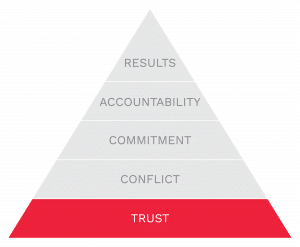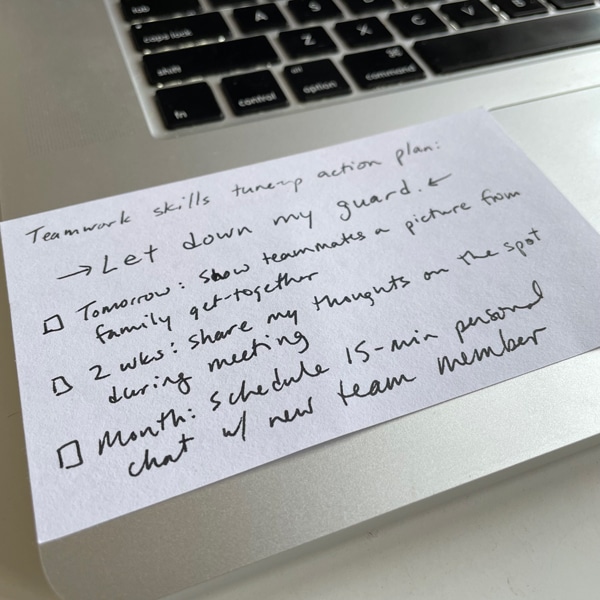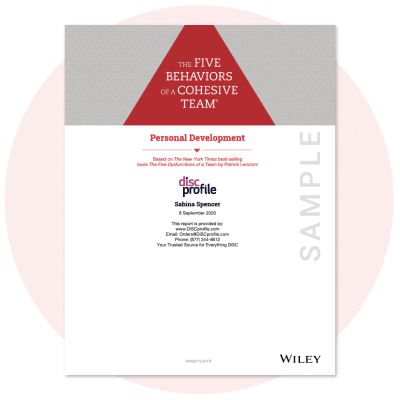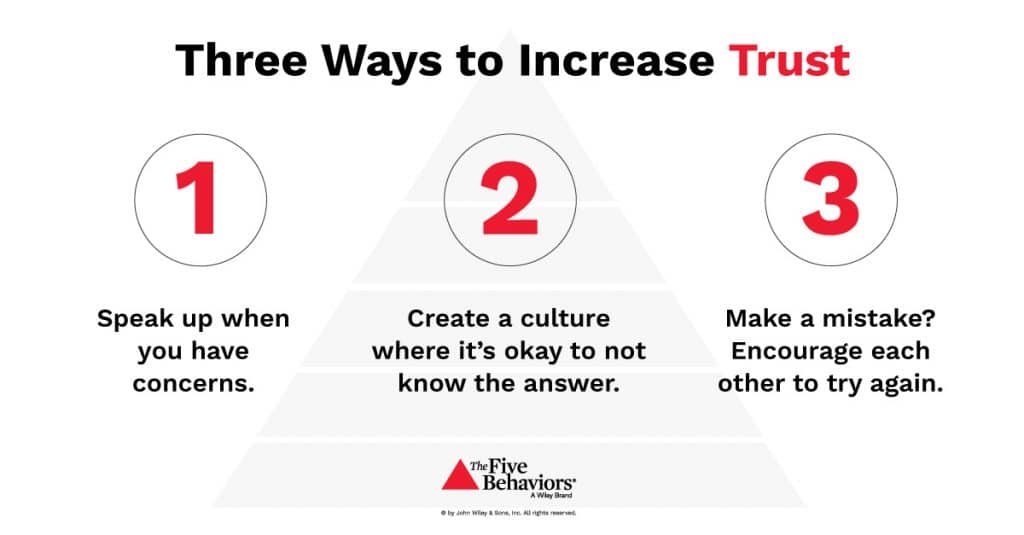If you are on one long-standing team, you likely have a sense of when the team is working well together and when there are problems. However, most people in today’s workforce are a part of many teams—teams that are complex, fluid, and dispersed. Sixty-two percent of people report working on project-based teams that come together briefly, produce work, then disassemble. Forty-one percent work on teams with consultants or other temporary contractors. And of course, those consultants and temporary workers have their own team experiences as they move from project to project.
Here’s some good news: Whether you are self-employed, working across several teams, or running a company, you can build teamwork skills that will make you a better teammate on every team.
This article series will lead you through a teamwork skills tune-up for each of the Five Behaviors of a cohesive team, starting today with the foundation of the whole model: trust.
What do we mean by trust?
Sometimes people use trust to mean you can predict someone’s behavior: “I trust he will get this project done” or “I trust you to do your job.” Within the Five Behaviors model, trust means specifically vulnerability-based trust—the willingness to:
- be unguarded and genuine with one another
- apologize and be open about weaknesses and mistakes
- assume good intentions of our peers
- ask for help and input

When we’re doing these things, we’re not wasting energy concealing flaws or assuming the worst. Instead, we direct energy to supporting the team using our collective skills.
Why is trust so hard?
In The Five Dysfunctions of a Team, Patrick Lencioni writes:
“Achieving vulnerability-based trust is difficult because in the course of career advancement and education, most successful people learn to be competitive with their peers, and protective of their reputations. It is a challenge for them to turn those instincts off for the good of a team, but that is exactly what is required.”
It is difficult to practice trust, and we won’t pretend otherwise. Recent research into the state of teams (PDF) shows that trust is a common challenge: Nearly 4 in 5 people report that their team members are typically not willing to acknowledge their weaknesses to one another.
People hold back from practicing trust for different reasons:
- fear of disapproval
- not wanting to lose influence
- fear of being perceived as naive
- anticipating negativity
- not wanting to appear incompetent
- fear of looking foolish
- not wanting to be taken advantage of
- concern about appearing weak
- fear of criticism
- not wanting to feel exposed
- not wanting to be a burden
- fear of a loss of harmony
- fear of being disliked
- fear of a loss of control
Like everyone, you have aspects of your personality that make trust difficult, but you also have natural assets useful to improving trust on a team. Maybe you excel at expressing yourself openly, or you’re great at listening to other people, or you always speak your mind. These are all traits that help build vulnerability-based trust.
How can I build trust on my teams?
Whether you’re part of a long-term team or one just coming together for a short project, there are individual skills you can develop to make yourself a great teammate—one people want to work with again.
Knowing what to work on starts with assessing your natural strengths and struggles around trust and teamwork. The Five Behaviors Personal Development assessment and profile were created for just this purpose. The 23-page report will give you a personalized road map for being a better teammate. Some general advice is below.
Understand what makes trust easier for you
When have you been part of a team you trusted? What was it about the environment, the people, the interactions, or behaviors that made trust easier for you in that scenario? Take a minute to articulate this in writing. Doing so forces you to get more concrete about what was working for you. A sample list may look like this:
- didn’t feel judged for being expressive and extroverted
- took time to talk about personal lives
- empathy!
- looked for ways to help each other
- mistakes were OK
- laughed a lot
Of course, your list may look quite different. This brings us to…
Understand what others need
While one person may find it easy to build trust in an environment where everyone is exuberant and quick to share personal details, that same situation is a surefire way to shut someone else down. Maybe they are naturally reserved and feel overwhelmed by the social atmosphere. Or maybe they are very results-focused and feel stressed out by what they see as a waste of time.
Review the list above of fears and concerns that make it hard for people to trust, and as you develop your teamwork skills, keep in mind that everyone is coming to the team from somewhere different.
Develop good trust habits
Luckily, there are proven habits that can help build trust across personality types. Depending on your personality, some of these suggestions will sound easier than others. If you complete a Five Behaviors Personal Development assessment, you’ll get a personalized work plan with concrete action items based on your responses. Some general tips are below. Rank them from easiest to most difficult, and pick one of the easier ones to start with. What would this practice look like on your current team(s)?
How to build trust on teams:
- Create space for people to admit mistakes and weaknesses.
- Thank teammates who show vulnerability.
- Remember that some people are more reserved; don’t take it personally.
- Be willing to let down your guard. This doesn’t need to take the form of some big personal revelation. It can be something like sharing an opinion about a work project that you’d normally keep to yourself.
- Readily apologize for your mistakes. This doesn’t diminish your value on the team. In fact, it can create value by improving trust and communication.
- Readily accept apologies from others for their own mistakes.
- When appropriate, ask for help.
- When appropriate, offer help.
- Spend time getting to know your teammates. Learning even a few basic things about their lives can help break down barriers and make your time together more efficient.
- Accept questions and input about your area of responsibility—don’t automatically get defensive.
- Assume good intentions. Give one another the benefit of the doubt.
Be specific about how you might put your chosen habit into action. Write down one thing you’ll do tomorrow to work on this skill, one thing you’ll do in the next two weeks, and something you’ll do within the next month. Keep this somewhere you will have to look at it every day. Better yet, tell teammates about your plan and post it somewhere they can see it, too. Here’s mine:
Let down my guard.
Tomorrow: Show teammates a picture from the family get-together I had this weekend
Next two weeks: Share my thoughts on the spot during team meeting instead of writing them up afterward
This month: Schedule 15-minute personal chat with new team member




